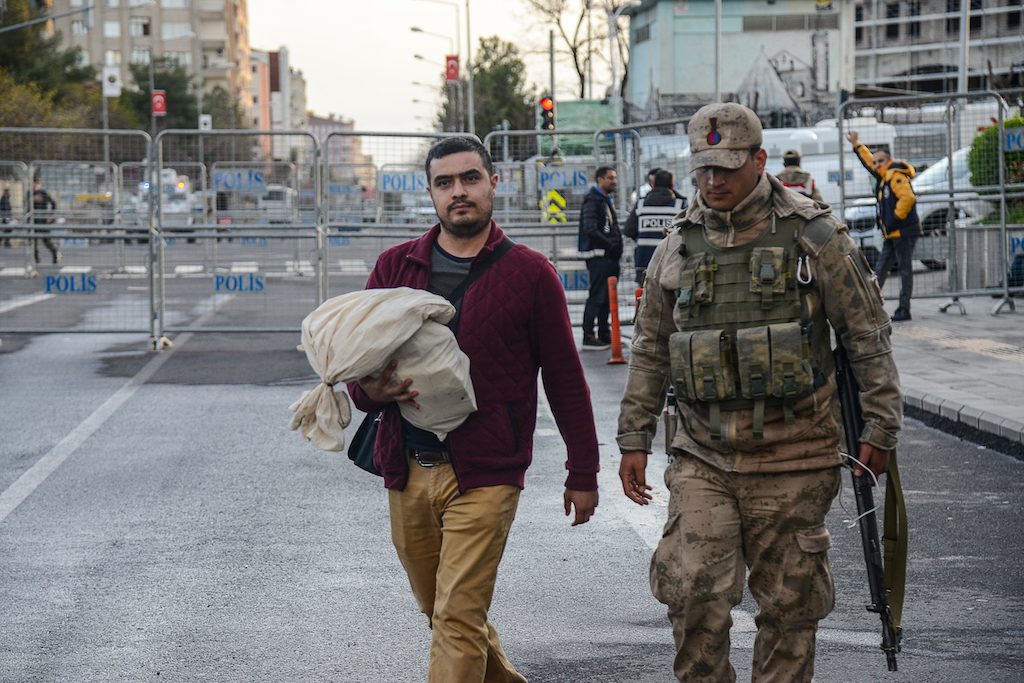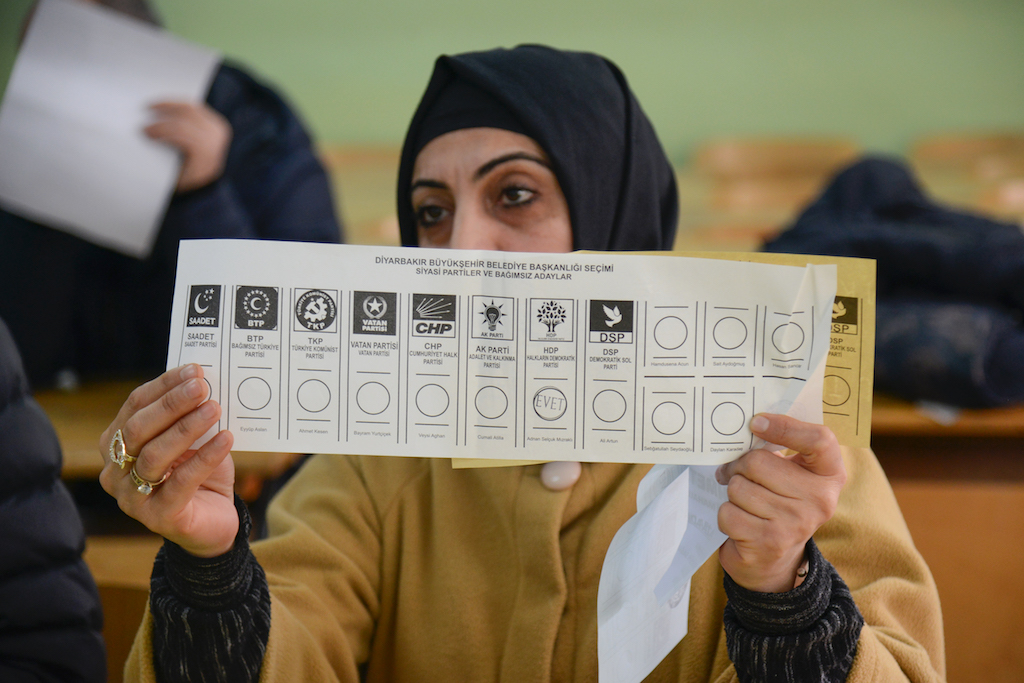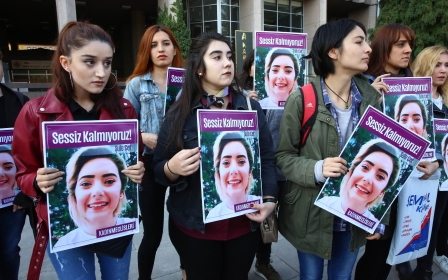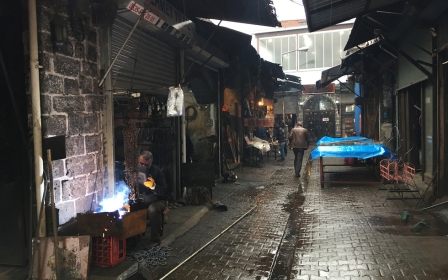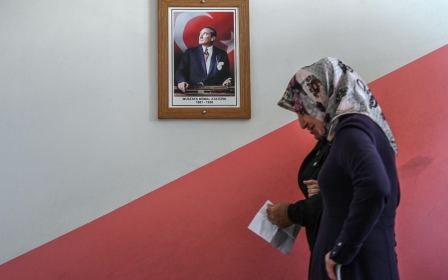'It is ours': Pro-Kurdish parties challenge AKP over knife edge results in south-east Turkey
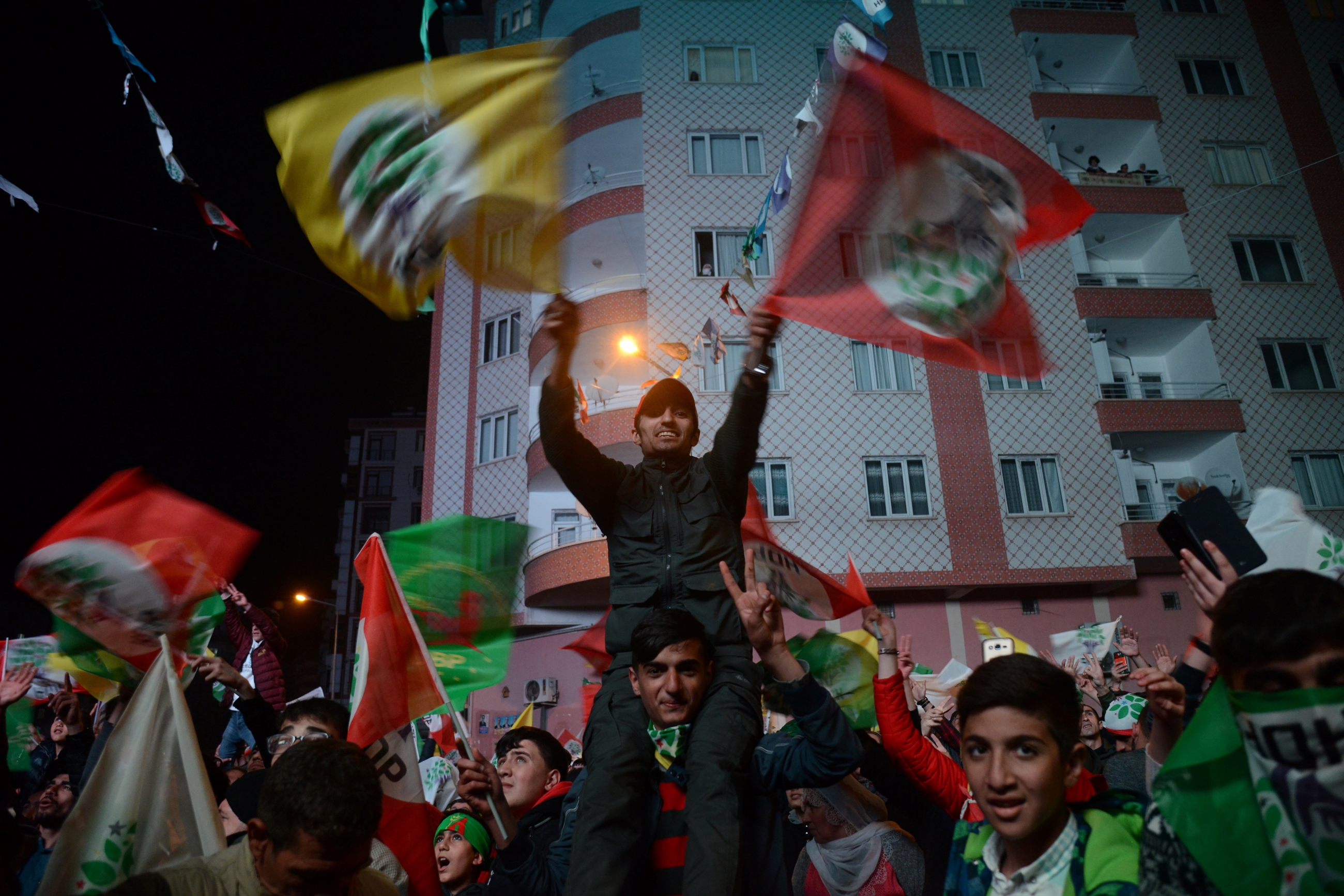
Less than three years ago, the Kurdish majority regions of southeast Turkey were the scenes of violent clashes between Kurdish militants and government security forces.
Last Sunday, for the first time since the violence, voters were able to choose their local representatives - and many voted to replace the government appointees who were imposed following the clashes and coup attempt of 2016.
However results have left uncertainty as the pro-Kurdish Peoples’ Democratic Party (HDP) and the ruling Justice and Development Party (AKP) trade blows in the aftermath of Sunday’s vote.
While the pro-Kurdish party won dozens of municipalities in provinces with a large Kurdish population, it is unclear whether they will be able to govern after the government launched a number of terrorist investigations against the HDP’s newly elected mayors.
In Istanbul, with over half of the ballot boxes recounted, the main opposition Republican People's Party (CHP) looks set to win the country’s largest city for the first time in 25 years.
New MEE newsletter: Jerusalem Dispatch
Sign up to get the latest insights and analysis on Israel-Palestine, alongside Turkey Unpacked and other MEE newsletters
'For the government, this election was all about proving their kayyum policy was the correct one,'
-Irfan Aktan, journalist
Alongside government losses in Ankara and Izmir, the elections represent the biggest electoral upset for the AKP since the party first gained electoral success in 2002.
Across western Turkey, the HDP’s decision not to stand candidates and instead urge supporters to vote for oppositional candidates proved decisive to the success of the CHP in Istanbul, as well as a number of other opposition gains from the AKP and its far-right Nationalist Movement Party (MHP) in Ankara, Adana and Mersin.
However, in the southeast, while the HDP increased its vote in some provinces they also lost the key provinces of Sirnak, Agri and Tunceli.
The party still managed to retain control of the majority of provinces in the region, securing eight provinces including the all-important metropolitan areas of Diyarbakir, Mardin and Van.
Much like the AKP in Istanbul, the HDP have contested a number of counts in provinces where they lost by small margins, but unlike the ruling party, their appeals have not been successful.
The elections had an added significance in the southeast after HDP mayors were removed from office and replaced by government-appointed trustees in 2016.
With this in mind, the HDP focused their campaign on winning back control of municipalities that had been stripped from them when the government decided to replace HDP-run municipalities with trustees, known as the kayyum.
In total, the government replaced 95 municipalities and arrested 100 mayors on suspicion of links with the outlawed Kurdistan Workers’ Party (PKK), a group that has been waging an insurgency in the southeast since 1984.
While pro-Kurdish politicians have been imprisoned on terrorism-related charges before, the instalment of the kayyum in 2016 was unprecedented in that it targeted local representation directly.
HDP’s campaign slogan, "Ya Me Ye’ – meaning ‘It is Ours’" in Kurdish – was a direct reference to the kayyum as the pro-Kurdish party attempted to expose the undemocratic nature of the trustees.
“For the government, this election was all about proving their kayyum policy was the correct one,” Irfan Aktan, a Ankara-based journalist who specialises on Kurdish affairs, told Middle East Eye.
The government claims the kayyum policy was necessary after the urban clashes between PKK-linked militants and security forces that consumed the region following the breakdown in peace talks in 2015.
The government imposed months-long curfews on cities as security forces sought to remove Kurdish fighters who had dug trenches and declared autonomy from the state.
According to the International Crisis Group, 4,300 people were killed in the violence that began in late 2015 and continued throughout 2016.
While HDP denies links with the PKK, the government alleged that the HDP-run councils lent support to the organisation and that fighters used municipal diggers to build defences.
'People have unanimously rejected Ankara-appointed trustees and want to elect their own mayors'
- Hulya Alokmen, HDP mayor
Furthermore, the government maintains that the kayyum administration has brought much-needed services and greater security to the region.
However, Hulya Alokmen, the newly elected HDP mayor for Diyarbakir province, told MEE that the kayyum cared little about representing local concerns and simply behaved like governors.
“When the kayyum came to Diyarbakir in November 2016, it supplanted all forms of elected representation in that both the elected mayors as well as the whole municipal assembly were replaced,” she said.
“In this election, we increased our vote and secured 63 percent, which shows that the people have unanimously rejected Ankara-appointed trustees and want to elect their own mayors.”
Ali Bayram, a lawyer from Sirnak, argued that that the kayyum allowed a return to normality but agrees that the centrally appointed administration was never accepted by locals.
“The kayyum is universally disliked by Kurds because when you visit the municipal buildings you are welcomed by security forces who act as a wall between the local administration and the citizens,” he told MEE.
“So even if people are pleased that certain services are resumed by the kayyum administration, everybody distrusts its presence because it denies citizens any form of local representation.”
AKP gains
However, despite the unpopularity of the kayyum, AKP exceeded expectations in Sirnak when their candidate, Mehmet Yarka, won nearly 60 percent of the vote, doubling the 30 percent they secured in the 2014 local elections.
Even though HDP obtained the majority of votes in the province as a whole, losing the mayoral election in Sirnak city is a significant setback for the party given the city has been in the control of pro-Kurdish parties for nearly 20 years.
“Mehmet Yarka is a well-respected business man from Sirnak who people trust to bring much needed development to the city,” Ali Bayram explained.
“The result shouldn’t be seen as local support for the kayyum or the government, but rather due to the urban clashes, it created a political climate where the people of Sirnak have prioritised investment which only an AKP administration can deliver on.”
Sirnak itself saw some of the worst violence, with more than 2,000 buildings destroyed and thousands of civilians fleeing during an 80-day operation and seven-month curfew in 2016.
Reports estimate more than 60 percent of the city has been destroyed as a result, and the HDP claimed the AKP had used the reconstruction of the city as a bargaining chip in securing votes in the city centre.
“Despite the completion of many apartments in the city centre which were designated for the displaced people of Sirnak, these apartments were not given to the locals before the elections as a means to influence people’s vote,” said Hisyar Ozsoy, an HDP MP for Diyarbakir.
'The city centre is full of construction, and people were afraid that if they voted for HDP, the construction might not be completed'
- Ali Bayram, lawyer
Ali Bayram also said that due to the damage inflicted upon the city when HDP last controlled the municipality, the people of Sirnak were wary of voting in another HDP administration.
“The city centre is full of construction, and people were afraid that if they voted for HDP, the construction might not be completed and therefore people wouldn’t benefit from it,” Bayram explained.
“Voting for AKP was partly out of fear of not taking these government services.”
The HDP have also claimed that another factor in the AKP’s victory was the presence of security forces who overwhelmingly voted for the ruling party.
However, despite this, others have pointed out how President Erdogan’s threat of changing the status of Sirnak from provincial capital to a district – which would drastically decrease the income of the city – may have played a role in convincing local Kurds to vote for AKP.
“Clearly the HDP lost the support of a number of middle-class Kurds in the city as they were scared by threats made by Erdogan to move the provincial capital from Sirnak to Cizre,” Aktan told MEE over the phone.
Election irregularity claims
Meanwhile, while the government has asked for patience and respect for the legal process in the Istanbul recount, the HDP has complained that both the provincial and higher electoral board has denied their application for a recount in various provinces in the southeast.
The party’s mayoral candidate Sirri Sakik lost the vote by less than 600 votes to the AKP candidate, and according to the party’s own election figures, as many as 2,500 HDP ballots were ruled as void.
“We believe Mus province has been stolen from us by the ruling AKP and so far, the electoral boards have failed to accept our appeals for a recount,” Sevin Coskun, the HDP MP for Mus told MEE.
“In Malazgirt district of Mus, we lost by only three votes. How can the government claim to respect the democratic process of a recount in Istanbul while ignoring our appeals for a recount in Mus?’’
“We appealed a number of counts in places where the numbers of votes deemed invalid were significantly higher than the margin of winning. While all our appeals to the electoral boards were rejected without any justified reason, the district and provincial boards have accepted a number of appeals by AKP or its ally MHP,” Hisyar Ozsoy, the HDP MP for Diyarbakir, told MEE.
“It is clear that the election boards are working under pressure from the ruling AKP-MHP coalition and reveal the undemocratic circumstances in which these elections were held.”
Can MPs take seats?
Another dynamic is whether the HDP will be allowed to continue running the municipalities that they won. During the election campaign, President Erdogan had stated that he would reinstate the kayyum without hesitation if "terrorists were re-elected."
'If the state truly believes the election results were a success, they should reintroduce a free democratic environment and then we’ll see who wins the election'
- Hisyar Ozsoy, HDP MP
Within days of the election results, the state has opened investigations against the two HDP co-mayors of Diyarbakir, Adnan Selcuk Mizrakli and Hulya Alokmen, who secured 63 percent of the vote in the province.
“It is clear that despite winning Diyarbakır province by a sizeable majority, the government has launched investigations against us in an attempt to prevent HDP from running their own municipalities”, Hulya Alokmen said.
“Even though one week has passed since the election, the state is yet to give us our
certificate of election so we haven’t been able to access the municipal buildings.”
Even if the kayyum is not reinstated, there is a question mark over whether they will be able to implement the projects they campaigned on. Much of their campaign focused on reinstating cultural and educational institutions that promote the Kurdish language and culture that had been closed down following the kayyum in 2016.
However, in Tunceli where the Turkish Communist Party (TKP) won the election and replaced the kayyum administration, a TKP councillor told MEE that the kayyum have embroiled the municipality with a significant debt of 68 million Turkish Lira ($12m).
“We believe the kayyum has used the municipality budget to finance a number of AKP projects that should have been paid using the general budget rather than the local budget,” Candan Badem, a TKP councillor, told MEE.
In Diyarbakir, where a kayyum was installed in November 2016, unconfirmed reports suggest the kayyum has left the metropolitan municipality with a debt of more than TL200 million.
Hulya Alokmen explained that as they have yet to be officially appointed as mayors, they haven’t been able to see the exact figures, but believes loading the municipality with debt is part of a broader tactic by the AKP to prevent the HDP from functioning at a local level.
“The staggering debt is just one method in which the state is attempting to stop our party from running local projects and providing much needed services to the people of Diyarbakir”, Alokmen said.
“Since the kayyum, the state has now changed the laws so it is very hard to approve a project without consent from Ankara. This is simply a form of control by Ankara to prevent us from functioning as a local administration.”
MEE attempted to contact AKP offices in Sirnak and Diyarbakir for comment, but was unable to get a response.
In provinces such as Diyarbakir, the local election results shows that HDP continues to retain the support of Kurds, but the loss of Sirnak and other provinces suggest some Kurds who had previously supported the party may have changed their mind.
“I think the result in Sirnak points towards a broader trend across the region where core supporters of HDP continue to support the party, while some middle-class Kurds who had previously voted for them but held some reservations about the party switched to AKP as they feared the return of a kayyum and preferred to elect an AKP administration.”
Ozsoy also reflected that this may have been the case, but contested that the scale of oppression against the party has influenced the result.
“For Kurds that aren’t so politically motivated, there is a concern of a possible violent confrontation between the Kurds and the state. While the state continues to falsely claim we are supporting terrorism and has imprisoned 6,000 of our members, this makes people scared to openly show their support for us,” he said.
“But if the state truly believes the election results were a success, they should reintroduce a free democratic environment and then we’ll see who wins the election.”
Middle East Eye delivers independent and unrivalled coverage and analysis of the Middle East, North Africa and beyond. To learn more about republishing this content and the associated fees, please fill out this form. More about MEE can be found here.


